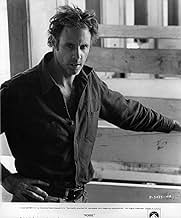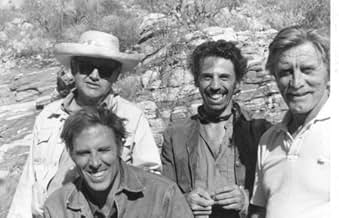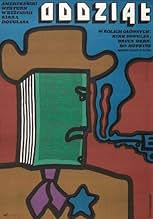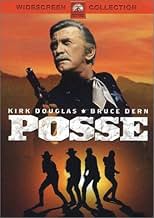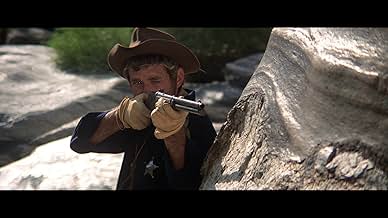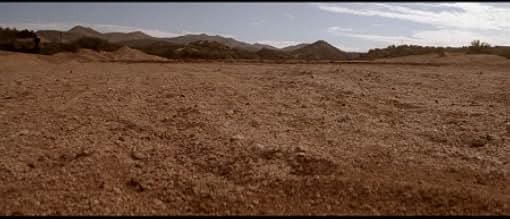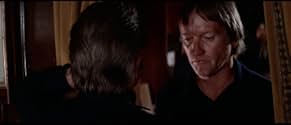IMDb RATING
6.5/10
2.6K
YOUR RATING
An unscrupulous politico marshal and his deputies chase a gang of train robbers whose leader proves that every man has his price.An unscrupulous politico marshal and his deputies chase a gang of train robbers whose leader proves that every man has his price.An unscrupulous politico marshal and his deputies chase a gang of train robbers whose leader proves that every man has his price.
- Awards
- 1 nomination total
William H. Burton
- McCanless
- (as Bill Burton)
Featured reviews
Kirk Douglas had already directed the somewhat terrible Scalawag in 1973, but that previous flop did not deter him from having a second stab at the directing job a couple of years on. Fortunately, Posse is a much more accomplished film than Scalawag in every way: Douglas's own direction is more assured, the script by Christopher Knopf and William Roberts is very literate and clever, and Fred Koenekamp's cinematography has a good, professional look about it. By 1975, one would have thought that there would be little mileage left in the western genre. It seemed that nothing new could be done, but this one comes up with a fresh twist by having the "hero" gradually revealed as an unlikable and ambitious social climber.
Marshal Howard Nightingale (Douglas) publicly announces that he will bring in infamous railroad bandit Jack Strawhorn (Bruce Dern). Although Strawhorn is a criminal of considerable notoriety - and definitely a man who belongs behind bars - Nightingale has an ulterior motive for apprehending his man. For the good Marshal has decided to run for the Texan senate, and believes that if he can nail Strawhorn - painting himself as a hero into the bargain - he will win over plenty of voters. Gradually, more and more people begin to see through Nightingale's selfish and egotistical political plans. His own posse have their doubts about how they will figure in the Marshal's future schemes; a news editor named Hellman (James Stacy) expresses distrust over the Marshal's ludicrously self-important opinion of himself; even Strawhorn eventually realises what his sly adversary is up to. Ultimately, Nightingale loses his posse and his public favour, with a little clever intervention from Strawhorn, and sees his political dreams left in tatters.
The critical response to Posse was much more favourable than Douglas's previous directing attempt, and deservedly so. The western action in the film is good, solid stuff, not too violent (as was the trend in '75), but certainly tough enough to satisfy genre addicts. Douglas gives a strong performance as the absurdly self-obsessed marshal, and Dern is even better as the charismatic, even likable, bandit. The subversive nature of the plot (hero gradually turns out to be villain, villain gradually turns out to be hero) is intriguing and fairly fresh, and helps to add interest to the film. While Posse has occasional lulls, and a few noticeably amateurish performances lower down the cast list, it remains a fresh, interesting, and intriguing addition to a virtually exhausted genre.
Marshal Howard Nightingale (Douglas) publicly announces that he will bring in infamous railroad bandit Jack Strawhorn (Bruce Dern). Although Strawhorn is a criminal of considerable notoriety - and definitely a man who belongs behind bars - Nightingale has an ulterior motive for apprehending his man. For the good Marshal has decided to run for the Texan senate, and believes that if he can nail Strawhorn - painting himself as a hero into the bargain - he will win over plenty of voters. Gradually, more and more people begin to see through Nightingale's selfish and egotistical political plans. His own posse have their doubts about how they will figure in the Marshal's future schemes; a news editor named Hellman (James Stacy) expresses distrust over the Marshal's ludicrously self-important opinion of himself; even Strawhorn eventually realises what his sly adversary is up to. Ultimately, Nightingale loses his posse and his public favour, with a little clever intervention from Strawhorn, and sees his political dreams left in tatters.
The critical response to Posse was much more favourable than Douglas's previous directing attempt, and deservedly so. The western action in the film is good, solid stuff, not too violent (as was the trend in '75), but certainly tough enough to satisfy genre addicts. Douglas gives a strong performance as the absurdly self-obsessed marshal, and Dern is even better as the charismatic, even likable, bandit. The subversive nature of the plot (hero gradually turns out to be villain, villain gradually turns out to be hero) is intriguing and fairly fresh, and helps to add interest to the film. While Posse has occasional lulls, and a few noticeably amateurish performances lower down the cast list, it remains a fresh, interesting, and intriguing addition to a virtually exhausted genre.
U.S Marshal Howard Nightingale is a man who has big political aspirations and to achieve this dream. He and his posse of deputies go after an out-law Jack Strawhorn. When Nightingale captures Strawhorn, just like his other captors or conquests he exploits it through the media for public support. Strawhorn would be Nightingale's ticket into the US senate, but Strawhorn thinks otherwise.
Can westerns be too low-key? 'Posse' felt so. Kirk Douglas directs and stars in this understated, but thoroughly ambitious under-the-radar western that had something cynical to say when it came to its closing credits. Quite heavy-handed and aware of its messages (money buys loyalty with the guys donning their badges being no better than the outlaws and representing an image (the people's?) to manipulative achieve a politically upper-hand), but the story's format is just so odd and subversive. The western conventions are there, but by the end William Roberts and Christopher Knopf's cleverly sharp (if sly) material basically turned it upside down with an ironic turn of events. It has that fragrance of the pioneer Hollywood westerns, but its punishing violence and sexual inclusions with a quiet, but powerful conclusion roots it in the 70s. The unusual theme to it and the effortlessly collected and cool-witted performances of Kirk Douglas and Bruce Dern (who shared a terrific chemistry) cover for how mechanical the film did look. Nothing totally skillful or stylish about it. Douglas' direction is raggedly rough and a little too plain. However some action shootouts and chase sequences were competently entertaining, but when the violence did hit, it wasn't presented in such a meaningless parade. It went hand-to-hand with the thoughtful nature of the script. Dick O'Neill's taut, but at times flashy photography is fluidly shot and Maurice Jarre's uncanny score is strongly delivered. Supporting Douglas and Dern (who's character's made great for sparing confrontations) is excellent performances by Bo Hopkins, James Stacy, Beth Brickell, Dick O'Neill and Alfonso Arau. A western that's too interesting to pass up because of the calculating tone lurking underneath.
Can westerns be too low-key? 'Posse' felt so. Kirk Douglas directs and stars in this understated, but thoroughly ambitious under-the-radar western that had something cynical to say when it came to its closing credits. Quite heavy-handed and aware of its messages (money buys loyalty with the guys donning their badges being no better than the outlaws and representing an image (the people's?) to manipulative achieve a politically upper-hand), but the story's format is just so odd and subversive. The western conventions are there, but by the end William Roberts and Christopher Knopf's cleverly sharp (if sly) material basically turned it upside down with an ironic turn of events. It has that fragrance of the pioneer Hollywood westerns, but its punishing violence and sexual inclusions with a quiet, but powerful conclusion roots it in the 70s. The unusual theme to it and the effortlessly collected and cool-witted performances of Kirk Douglas and Bruce Dern (who shared a terrific chemistry) cover for how mechanical the film did look. Nothing totally skillful or stylish about it. Douglas' direction is raggedly rough and a little too plain. However some action shootouts and chase sequences were competently entertaining, but when the violence did hit, it wasn't presented in such a meaningless parade. It went hand-to-hand with the thoughtful nature of the script. Dick O'Neill's taut, but at times flashy photography is fluidly shot and Maurice Jarre's uncanny score is strongly delivered. Supporting Douglas and Dern (who's character's made great for sparing confrontations) is excellent performances by Bo Hopkins, James Stacy, Beth Brickell, Dick O'Neill and Alfonso Arau. A western that's too interesting to pass up because of the calculating tone lurking underneath.
Bet you didn't know that Kirk Douglas took the director's chair a couple of times, POSSE being one of them. If you like westerns, like me, you'll probably find this decent. The movie does suffer from the middle third of the movie, where the story pretty much grinds to a halt. Though this part wasn't really boring, it will probably make you wish they would get on with it. Also, the actions taken by certain characters near the end, though having some justification, didn't seem to have enough justification.
On the positive side, POSSE is well shot, well acted, good production values, and an interesting ending. It's worth seeing.
P.S. - Leonard Maltin's description of this movie isn't exactly how the movie plays.
On the positive side, POSSE is well shot, well acted, good production values, and an interesting ending. It's worth seeing.
P.S. - Leonard Maltin's description of this movie isn't exactly how the movie plays.
Not a bad western, but not a real winner either. Most of the acting was good, but some of the performers need to go back to drama class and bone up a bit. Douglas and Dern kept the show going with their give and take, although I don't think the real lawmen and desperados actually carried on in this fashion. I think Strawhorn was more of a realist than a truly bad person; he saw the reality of life and became practical because of his vision. Dealing with 2 faced con men like Nightingale merely solidified his outlook on life.
On screen I find Kirk Douglas to be without peer, but I have come to admire him as much if not more for his real-life advocacy of some highly unorthodox, yet worthy projects.
If this movie doesn't rank among his very best, it is still remarkable for how unapologetically it goes against the grain and makes a very bold personal statement (one that was not so popular at the time but resonates to this day). All the while he is producing and directing himself in what proves to be a rather unflattering role. I can't think of anyone else who would have the real-life grit to do such a thing - Kirk Douglas has done so repeatedly with aplomb.
If this movie doesn't rank among his very best, it is still remarkable for how unapologetically it goes against the grain and makes a very bold personal statement (one that was not so popular at the time but resonates to this day). All the while he is producing and directing himself in what proves to be a rather unflattering role. I can't think of anyone else who would have the real-life grit to do such a thing - Kirk Douglas has done so repeatedly with aplomb.
Did you know
- TriviaThis movie was the first role for James Stacy following his 1973 motorcycle accident in which he was hit by a drunk driver, resulting in the loss of his left arm and left leg. Kirk Douglas created the role especially for Stacy.
- GoofsUS Senators were not directly elected at the time of the film's setting. They were appointed by State Legislatures until the 17th Amendment in 1913.
- Quotes
Jack Strawhorn: Every day above ground is a good day.
- ConnectionsReferenced in Talking Pictures: Allan Warnick, Supporting Actor in 'Chinatown' (2022)
- SoundtracksI've Been Working on the Railroad
(uncredited)
Traditional
The first line is sung during Nightingale's speech
- How long is Posse?Powered by Alexa
Details
Box office
- Budget
- $2,000,000 (estimated)
- Runtime1 hour 32 minutes
- Sound mix
- Aspect ratio
- 2.35 : 1
Contribute to this page
Suggest an edit or add missing content



